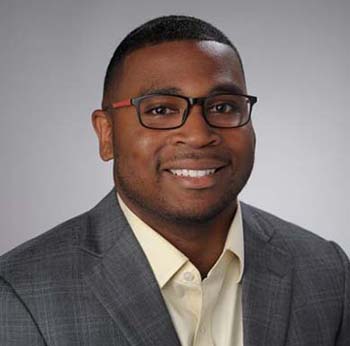
Brandon Hollie was a dissertation fellow with the Minority Fellowship Program (MFP) at the American Association for Marriage and Family Therapy (AAMFT). He completed his B.A. from the University of Iowa and his M.A. from Mount Mercy University. Most recently, he completed a Ph.D. in marriage and family therapy at Syracuse University in May 2021, with a focus on examining the protective effect of Black cultural strengths and their impact on poverty and neighborhood characteristics on the mental health and parent-child closeness in the Black community. Dr. Hollie will continue his educational pursuits as a postdoctoral research fellow at Northwestern University.
Dr. Hollie was initially drawn to the MFP because its purpose and goals aligned with his passion and career goals. He shared, "I have a strong desire to increase access to treatment and build culturally relevant therapeutic services for minority populations and felt the MFP could help me achieve this goal." Recently, Dr. Hollie and colleagues developed a university/community collaboration that provides free, collocated therapeutic services to communities of color largely impacted by community traumas. He explained, "My hope is that such work will provide knowledge of relational-focused Black cultural interventions for improving the mental health of the Black community."
When reflecting on how the MFP has enriched his academic and professional career, Dr. Hollie shared that the program has helped hone his research skills and increased his knowledge of providing culturally relevant therapeutic services. He explained, “The research and statistical knowledge I have gained through the MFP will help me be an effective researcher. The increase of culturally relevant knowledge will help me as I plan to expand on the way we look at therapeutic services for the Black community.” The MFP has also helped to build and nurture Dr. Hollie’s professional network with others in his field. He shared, “I have made lifelong connections through MFP. Not only do I have great connections in the field of marriage and family therapy, but I have also made friends with people who have the same morals and values that I hold.”
After completing the MFP, Dr. Hollie plans to work to ensure access to culturally relevant and responsive therapeutic services, while continuing to conduct research. He shared, “I plan to contribute to the field of marriage and family therapy by continuing to build university and community collaborations to enhance mental health of the Black community; plan and orchestrate grassroots efforts to increase access to treatment for the Black community; and reduce violence in inner-city communities through work with community advocates and credible messengers. I also want to work in the capacity where I am able to produce systemic change. Ideally, I will be working in leadership at a healthcare facility while also producing scholarly research.”
When asked if he had advice for anyone thinking about applying to the MFP, Dr. Hollie said, “This is a great opportunity to become a culturally responsive researcher and service provider. I would recommend this for anyone that plans to be a clinician or work in academia.” In closing, he shared, “This is an opportunity to hone your skills as a researcher and clinician while simultaneously increasing your social network of connections and building lifelong friends.”